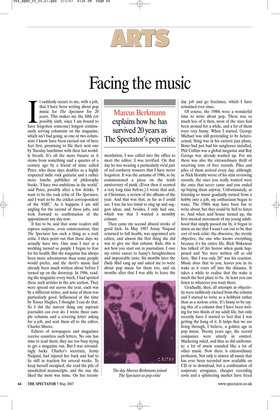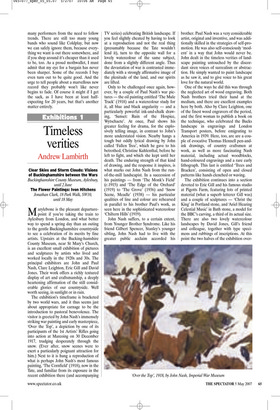Facing the music
Marcus Berkmann explains how he has survived 20 years as The Spectator’s pop critic
It suddenly occurs to me, with a jolt, that I have been writing about pop music for The Spectator for 20 years. This makes me the fifth (or possibly sixth, since I am bound to have forgotten someone) longest continuously serving columnist on the magazine, which isn’t bad going, as one or two columnists I know have been carried out of here feet first, promising to file their next one by Tuesday lunchtime with their last worldly breath. It’s all the more bizarre as it stems from something said a quarter of a century ago by a friend of mine called Peter, who these days doubles as a highly respected indie rock guitarist and a rather more louche publisher of philosophy books. ‘I have two ambitions in the world,’ said Peter, possibly after a few drinks. ‘I want to be the rock critic of The Spectator, and I want to be the cricket correspondent of the NME.’ As it happens I am still angling for the second of these jobs, and look forward to confirmation of the appointment any day now.
It has to be said that some readers still express surprise, even consternation, that The Spectator has such a thing as a rock critic. I then point out that these days we actually have two. One man I met at a wedding turned so purple I began to fear for his health. But the magazine has always been more adventurous than some people would prefer, and the devil’s music had already been much written about before I turned up on the doorstep. In 1986, reading the magazine every week, I had spotted three such articles in the arts section. They were spread out across the year, each was by a different writer, and none of them was particularly good. Influenced at the time by Yosser Hughes, I thought: I can do that. So I did the naivest thing any aspirant journalist can ever do. I wrote three sample columns and a covering letter asking for a job, and sent them all to the editor, Charles Moore.
Editors of newspapers and magazines receive countless such letters. No one has time to read them; they are too busy trying to get a magazine out. But I was astoundingly lucky. Charles’s secretary, Jenny Naipaul, had injured her back and had to lie still in traction for several weeks. To keep herself occupied, she read the pile of unsolicited manuscripts, and the one she liked the most was mine. On her recom mendation, I was called into the office to meet the editor. I was terrified. On that day he was wearing a particularly vivid pair of red corduroy trousers that I have never forgotten. It was the autumn of 1986, so he commissioned a piece on the tenth anniversary of punk. (Even then it seemed a very long time before.) I wrote that and, at Christmas, a review of the albums of the year. And that was that, as far as I could see. I was far too timid to ring up and suggest ideas, and, besides, I only had one, which was that I wanted a monthly column.
Then came my second absurd stroke of good luck. In May 1987 Jenny Naipaul returned to full health, was appointed arts editor, and almost the first thing she did was to give me that column. Kids, this is not how you start out in journalism. I owe my entire career to Jenny’s farsightedness and impeccable taste. Six months later the Daily Mail rang up and asked me to write about pop music for them too, and six months after that I was able to leave the day job and go freelance, which I have remained ever since.
Of course, the 1980s were a wonderful time to write about pop. There was so much less of it then, most of the stars had been around for a while, and a lot of them were very funny. When I started, George Michael was still pretending to be heterosexual, Sting was in his earnest jazz phase, Bono had just had his sunglasses installed, Phil Collins was a global megastar and Boy George was already washed up. For me there was also the extraordinary thrill of receiving tons of free records. Piles and piles of them arrived every day, although, as Nick Hornby wrote of his stint reviewing records, the ones you really wanted were the ones that never came and you ended up buying them anyway. Unfortunately, as listening to music gradually turned from a hobby into a job, my enthusiasm began to wane. The 1980s may have been fun to write about, but they could be hell to listen to. And when acid house turned up, the first musical movement of my young adulthood that simply passed me by, it began to dawn on me that I wasn’t cut out to be that sort of rock critic: the obsessive, the sternly objective, the one who knows everything because it’s his entire life. Rick Wakeman has talked of his horror when punk happened and Yes were written off as old farts. ‘But I was only 28!’ was his reaction. Music does that to you, leaves you in its wake as it roars off into the distance. It takes a while to realise that the wake is much the best place to be. At least you can listen to whatever you want there.
Gradually, then, all attempts at objectivity were ruthlessly excised from the column and I started to write as a hobbyist rather than as a serious critic. It’s funny to be saying this of a column that I have been writing for two thirds of my adult life, but only recently have I started to feel that I was getting the hang of it. It helps that we are living through, I believe, a golden age in pop music. Twenty years ago, the record companies were utterly in control. Marketing ruled, and thus so did uniformity: a lot of music sounded like a lot of other music. Now there is extraordinary profusion. Not only is almost all music that has ever been recorded now available on CD or to download, but a combination of corporate arrogance, cheaper recording costs and a splintering market have freed many performers from the need to follow trends. There are still too many young bands who sound like Coldplay, but now we can safely ignore them, because everything we want is out there somewhere, and if you shop around it’s cheaper than it used to be, too. As a proud mothwallet, I must admit that my eye for a bargain has never been sharper. Some of the records I buy even turn out to be quite good. And the urge to tell people about a marvellous new record they probably won’t like never begins to fade. Of course it might if I get the sack, as I have been at least halfexpecting for 20 years, but that’s another matter entirely.



































































































 Previous page
Previous page